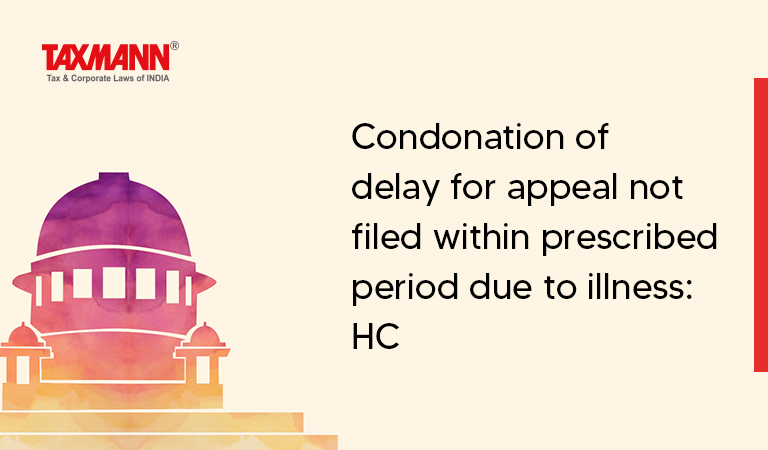Condonation of delay for appeal not filed within prescribed period due to illness: HC
- Blog|News|GST & Customs|
- 2 Min Read
- By Taxmann
- |
- Last Updated on 9 March, 2023

Case Details: Kajal Dutta v. Assistant Commissioner of State Tax - [2023] 148 taxmann.com 112 (Calcutta)
Judiciary and Counsel Details
-
- T. S. Sivagnanam & Hiranmay Bhattacharyya, JJ.
- Sumit Ghosh & Souradeep Majumdar for the Appellant.
- T. M. Siddique, Debasish Ghosh, Nilotpal Chatterjee & V. Kothari for the Respondent.
Facts of the Case
The appellant filed appeal against the adjudication order but the Senior Joint Commissioner who was Appellate Authority has dismissed the appeal on the ground of limitation. It filed writ petition against the order of rejection of appeal but the learned Single Bench declined to interfere with the said order. Therefore, it filed intra-Court appeal challenging the correctness of the order passed in the writ petition.
High Court Held
The Honorable High Court noted that as per Section 107(1) read with Section 107(4) of the CGST Act, 2017, the time limit for preferring the appeal beyond the period of three months is 30 days, which is a grace period. However, the statute does not state that beyond the said date, the appellate authority can’t exercise jurisdiction.
In the instant case, the appeal was not filed within prescribed period on account of illness for which doctor’s certificate was also enclosed. Therefore, it was not a case that the appellant had deliberately presented the appeal beyond the condonable period.
Therefore, the Court noted that while exercising jurisdiction under Article 226 of the Constitution this Court can examine the factual circumstances and grant appropriate relief as the appellate remedy is a very valuable remedy since the appellate authority can re-appreciate the factual position.
Thus, the Court held that the delay in filing appeal before Appellate Authority was to be condoned and Appellate Authority was directed to consider and decide appeal on merits.
Disclaimer: The content/information published on the website is only for general information of the user and shall not be construed as legal advice. While the Taxmann has exercised reasonable efforts to ensure the veracity of information/content published, Taxmann shall be under no liability in any manner whatsoever for incorrect information, if any.

Taxmann Publications has a dedicated in-house Research & Editorial Team. This team consists of a team of Chartered Accountants, Company Secretaries, and Lawyers. This team works under the guidance and supervision of editor-in-chief Mr Rakesh Bhargava.
The Research and Editorial Team is responsible for developing reliable and accurate content for the readers. The team follows the six-sigma approach to achieve the benchmark of zero error in its publications and research platforms. The team ensures that the following publication guidelines are thoroughly followed while developing the content:
- The statutory material is obtained only from the authorized and reliable sources
- All the latest developments in the judicial and legislative fields are covered
- Prepare the analytical write-ups on current, controversial, and important issues to help the readers to understand the concept and its implications
- Every content published by Taxmann is complete, accurate and lucid
- All evidence-based statements are supported with proper reference to Section, Circular No., Notification No. or citations
- The golden rules of grammar, style and consistency are thoroughly followed
- Font and size that’s easy to read and remain consistent across all imprint and digital publications are applied



 CA | CS | CMA
CA | CS | CMA
